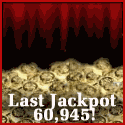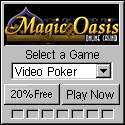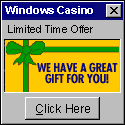Play
To Win
Tips and strategies to help make you a winning casino player Game
Rules
Learn: Blackjack, Baccarat, Craps, Roulette, Slots, Video Poker, Pai Gow Poker
Systems Gallery
Win more, more often with proven betting methods from the systems gallery
Order
Form
A secure on-line order form to purchase products advertised by Let's Talk
Winning.
Playing Online
All about gambling at online casinos. Find out where the best deals are
Links
and Things
Sign our guestbook, refer a friend, link to other gambling sites
Newsletter
Click above to read the current edition of our
weekly newsletter. Then get your own free subscription right here. Enter your e-mail
address for immediate delivery of an introductory issue, including a FREE ROULETTE SYSTEM:
Please tell all
your friends about it.
On-Line Forum
Post a gambling question or opinion - get an
answer . . .
 Wanna Win At Slots? Click
Here! Wanna Win At Slots? Click
Here!






It's now $50 bonus every month!





|
=========================================
Thursday, August 2, 2001
Being
the House
Hello
everyone,
Here is what Andrew N.S.
Glazer has to say about being the house.
In most casino
games, the house has an inescapable, long-term mathematical advantage. Of course,
knowledge of that fact rarely stops players looking for action. Some of us spend thousands
of hours developing skills in the few games where we can win long-term: poker, video poker
and blackjack. If it is to be successful, this process sometimes resembles hard work a lot
more than it does most people's idea of fun.
But wouldn't it be great
if you could get in there and have your rock 'em, sock 'em gaming action and a long-term
advantage without having to study for months or years?
You might as well wish for world peace while you're at it, right? Well, not
really. And relax, this isn't a story about how you can become a consistent winner by
buying my exclusive, super-secret $10,000 roulette system, sold only to gamblers who
promise to take the secret to their grave.
Instead, this is a story
about making your money the old-fashioned way. No, not by earning it. What self-respecting
gambler would want to do that? And no, not by cheating, although cheating is certainly an
old-fashioned way to make money gambling.
This is about being the
house.
I'm not suggesting you
try to buy the MGM Grand from Kirk Kerkorian, or that you start an Internet casino. In
chemin de fer, pai gow and pai gow poker, you can bank the bets while someone else is
paying for the building. Whether you would WANT to be the house depends on a lot of
things, not the least of which is your bankroll.
You need a big one.
Just as casinos need
stacks of cash to be able to withstand the inevitable fluctuations that occur even in
advantage gambling, if you're going to bank one of these games, you need both a lot of
money and the willingness to risk it.
Assuming you qualify on
these two points (which means, I imagine, that you either inherited your cash or made it
with Internet stocks, because if you'd worked hard for it you wouldn't fling it around so
easily), here's how the deal goes down.
Most American gamblers have seen chemin de fer, but not in casinos: They've
seen it in James Bond movies, because it's the European version of the game we play as
baccarat on this side of the pond. While American-style baccarat is a tame, triviall easy
house game, in chemin de fer you actually have to make a few strategic decisions. Not many
- the rules of the game are still fixed for the vast majority of
plays - but there are a few options left to the players on certain hands.
If you're feeling like a high roller, you'll get a chance to be the bank at some point
during the evening. The player to the dealer's right has the first chance to call
"banco," which means he agrees to fade ALL of the action at the table (gulp!).
If the player to the dealer's immediate right is sane and declines, the option passes to
the player on his right, and so on, and eventually to spectators.
If you call
"banco" and lose, you have the right to inflict further punishment on yourself,
er, I mean, recoup your losses, by retaining the bank the next deal, regardless of who
would otherwise have preference. If no one wants the whole bank, partial wagers are
accepted.
Unfortunately, taking the bank at chemin de fer really isn't being the house. The rules of
the game, while allowing certain optional plays, still force the players to play most of
their hands perfectly, and even with a perfect performance, the bank is only a slight
favorite over the player.
But because someone who cries "banco" must pay the house a 5 percent commission
on winning bets, the banker cannot gain an edge on the house. The banker will win more
hands thaI:l he loses, and won't face as bad a percentage disadvantage as people just
playing the game. But even the most skilled banker won't, over the long run, be able to
overcome the cost of the commission, because the rules prevent players from playing badly
enough to give the banker an edge.
The news are better in pai gow poker. First, you don't have to fly
to Monte Carlo. It's available at casinos all over the United States. It's also very
popular in the vast numbers of "player vs. player" California card casinos.
(California law allows card rooms where players compete against each other but not against
the house, which is why so many poker rooms exist there.)
Banking paigow poker can generate a very small advantage, IF you can find the right game.
The right game is one where you're able to bank as much as possible, and where during your
non-banking turns you're able to bet very little compared with the other players.
The banker has a built-in advantage of about 1.3 percent over other players, but the
banker must overcome either a 5 percent rake on winning hands (in Nevada, most other
casino states and some pans of California) or a time
charge (in the rest of California).
The best opportunity lies in the California games with the time charge, because a table
fee can be tiny in relation to the sum you can bank. Suppose you're fading $6,000 worth of
action. A 5 percent rake would cost you $300. You might be able to fade that same
action in a California card room for $2 or $3. Even allowing for the fact that you're only
going to win about one hand in five ( 60 percent will be ties and 20 percent will be
player wins), it's easy to see that $10 to $15 in table charges
beats the heck out of a $300 rake.
Because the rake is only charged on winning hands, and because so many hands will result
in either losses or ties (also known as copies), it turns out that the rake costs the
banker only about 1.6 percent. The exact number is a little higher if as banker you have
only one opponent, and drops slightly with each additional opponent, down to almost 1
percent with six opponents betting more than you. A little math shows you that with one
opponent you're still playing a house-advantage
game, and with six opponents who are willing to give you the bank more than one time in
seven, you're playing an advantage game. You can get a slight additional edge by playing
perfectly. Stanford Wong, in his fine book Optimal Strategy for Pai Cow Poker, estimates
that with perfect play you can add about 0.3 percent to your edge.
In pai gow poker, each player gets seven cards, and must set them into two hands, a
five-card poker hand and a two-card poker hand. The five-card hand must have a higher
value than the two-card hand. For example, if you were dealt A-K-J-Q-3-3-2, you could not
set your cards with 3-3 in the two-card hand and A-K-Q-J-2 in the five-card hand. If you
mis-set your hand as a player, you are said to have "fouled"
and you lose automatically; If you mis-set as the bank, the dealer will correct it for
you.
Most of the time, the correct play is intuitively obvious if you understand the ranking of
poker hands, probably even more so than it is in blackjack. Although this means that
most players will play more than 95 percent of their hands correctly (Wong estimates 98
percent) , it also leads to trouble for players who don't bother to learn the correct
plays for the other 2 to 5 percent of the time.
Trouble for them, advantage for you, IF you learn the correct plays. And if you're going
to be risking the sort of money that a banker must in this game, you'd have to be insane -
or have a very spendthrift attitude - not to learn the correct plays. You can easily
(indeed, to have the best percentage edge, you'd hope to) fade $500 or more in action
every single hand, often $1,000 or more, and for that sort of game you need a bankroll in
the $50,000 range.
Bill Zender, a gambling consultant and author of two of the best books available on pai
gow (Pai Gow Without Tears) and pai gow poker (Pai Gow Poker), told me that, like
blackjack, pai gow was a lot easier to win at in "the good old days."
"In the early to mid 1980s," Zender said, "players were so bad at pai gow
poker that someone banking could probably count on winning one hand an hour just from
someone fouling, and even when players weren't that bad, they still really didn't have a
good understanding of how best to play their hands. These days, most players have a pretty
good idea of how to play; and truly bad players are uncommon."
Nonetheless, if you find yourself living in (or visiting) an area where pai gow poker is a
new game, there might be some additional edge for you.
On the other hand (although the house cenainly helps with this), you also need to keep a
very sharp eye out for cheats. Some of them might exchange cards, others might cap their
bets, meaning they increase them on the sly once they have been dealt a good hand. Just as
the actual house has a certain cost of doing business with such players, so too will you
as the banker. Hey; who said being the house
was all fun and games?
The principles behind banking at pai gow - the original Asian game from which pai gow
poker descended - are the same. At pai gow you have less worry about cheaters because it's
a bit harder to palm and exchange a tile than it is to palm and exchange a card (although
the capping problem still exists). It's much harder, however, to leam the correct plays
with the tiles than it is with cards, because the right moves are not intuitively obvious.
English speakers looking to be the bank may also have to reckon with a language barrier.
The majority of players seated at pai gow tables are Asian, and a lot of the conversation
will not be in English. Because being the bank as much as possible is critical to getting
an edge on the game, your social skills with the other players - both in pai gow
poker and in pai gow - are critical. If the other players like you, they will be more
willing to hand the bank to you. If you're an outsider who does not speak their language,
it will be that much more difficult for you to hold the bank the majority of the time. If
you do speak the language and understand the culture, your ethnicity probably won't matter
at all.
Even if you do pass over the hurdles necessary to become good at the game, the bank enjoys
a slightly smaller percentage edge in pai gow than it does in pai gow poker, and you can
never benefit from a player foul, because there is fouling in the tile game.
For most American players, the most profitable casino banking option is clearly pai gow
poker. But even this winning" answer is only viable for those who have an awful lot
of money.
There is another "banking" option, short of starting your own casino, and that's
holding some kind of home game where you are the house. In America these days, that's most
commonly a poker game where the host takes a $5 chip out of each pot in return for
supplying a place to play, food, etc.
As most participants in home poker quickly realize, the host usually makes
out like a bandit in such games. If the game goes late at all, the host takes at least
$1,000 a night out of the game, and at the end of the year, the rake is often the only
winner in the game.
Although this sounds like a terrific way for a poker player to supplement his or her
income, execution of the plan involves lots of problems.
First, it's against the law, which makes the game an infinitely more likely target for
police action than a private game where no one is taking a profit for running it. Police
tend to view the latter as social activity and the former as illegal gambling.
How could the police find out about such a game? Any losing player's spouse is a potential
source of trouble. Additionally, there are usually three or four cell phones in action at
any game, as well as a cordless phone in the house, and people using cell or cordless
phones have the hardest time remembering that they are on the
radio. A regular congregation of lots of cars in prime parking spaces also draws attention
in a lot of locales.
The person running a home poker game also invariably takes some lumps in the form of
checks that turn out to be bad. "Cash only" policies can lead to other forms of
trouble. For one, players run short of money and the person running the game is left to
choose between a game breaking up and the extension of credit: Cries of "I can't
afford to take the risk" will both alienate the credit applicant and not get much
sympathy from people who've been chipping in to give you $1,000 a night.
If somehow the game's host does get away with a "cash only" policy, the game
becomes much more vulnerable to robbery.
Whether you choose to bank a home game or a casino game, it's pretty clear that opting to
be the bank isn't quite a license to print money: Usually, it's a high risk, high anxiety
option where you're earning every dollar you make. My view is that for someone with
$50,000 to invest, there are better places to put it than a pai gow poker table. But if
you want to gamble, don't want to study for years and can stand
the heat, it beats the heck out of buying 50,000 lottery tickets.
Most on-line
casinos offer a sign-up bonus at the time you register with them, and often it's a one
shot deal. Sands of
the Caribbean, that I consider one of the best on-line casinos, has so far offered $25
bonus every month upon your $50 deposit.
Starting August 1, this bonus is doubled to $50 upon a deposit of $100. And you can
get it each and every month. This means $600 free cash for you per year from Sands of the Caribbean.
This is a great deal. Make sure to take advantage of it.
Wishing you
all the best,
Until next week,
Izak
| WOULD YOU LIKE
TO SUBSCRIBE? |
 |
If you missed any
newsletter, click here for an archive.

|
 Let's Talk Winning
Let's Talk Winning